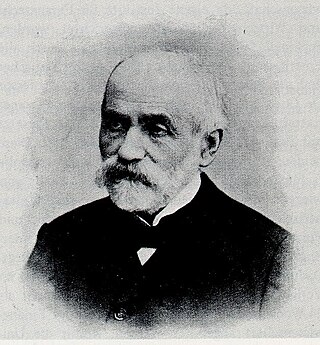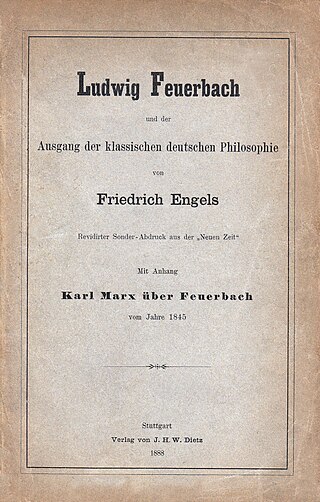
Carl Menger von Wolfensgrün was an Austrian economist and the founder of the Austrian School of economics. Menger contributed to the development of the theories of marginalism and marginal utility, which rejected cost-of-production theory of value, such as developed by the classical economists such as Adam Smith and David Ricardo. As a departure from such, he would go on to call his resultant perspective, the subjective theory of value.

Karl Marx was a German-born philosopher, political theorist, economist, historian, sociologist, journalist, and revolutionary socialist. His best-known works are the 1848 pamphlet The Communist Manifesto and his three-volume Das Kapital (1867–1894); the latter employs his critical approach of historical materialism in an analysis of capitalism, in the culmination of his intellectual endeavours. Marx's ideas and their subsequent development, collectively known as Marxism, have had enormous influence on modern intellectual, economic and political history.

Friedrich Engels was a German philosopher, political theorist, historian, journalist, and revolutionary socialist. He was also a businessman and Karl Marx's closest friend and collaborator, serving as a leading authority on Marxism.

Johann Kaspar Schmidt, known professionally as Max Stirner, was a German post-Hegelian philosopher, dealing mainly with the Hegelian notion of social alienation and self-consciousness. Stirner is often seen as one of the forerunners of nihilism, existentialism, psychoanalytic theory, postmodernism and individualist anarchism.
In the 19th century, the philosophers of the 18th-century Enlightenment began to have a dramatic effect on subsequent developments in philosophy. In particular, the works of Immanuel Kant gave rise to a new generation of German philosophers and began to see wider recognition internationally. Also, in a reaction to the Enlightenment, a movement called Romanticism began to develop towards the end of the 18th century. Key ideas that sparked changes in philosophy were the fast progress of science, including evolution, most notably postulated by Charles Darwin, Alfred Russel Wallace and Jean-Baptiste Lamarck, and theories regarding what is today called emergent order, such as the free market of Adam Smith within nation states, or the Marxist approach concerning class warfare between the ruling class and the working class developed by Karl Marx and Friedrich Engels. Pressures for egalitarianism, and more rapid change culminated in a period of revolution and turbulence that would see philosophy change as well.

Conflict theories are perspectives in political philosophy and sociology which argue that individuals and groups within society interact on the basis of conflict rather than agreement, while also emphasizing social psychology, historical materialism, power dynamics, and their roles in creating power structures, social movements, and social arrangements within a society. Conflict theories often draw attention to power differentials, such as class conflict, or a conflict continuum. Power generally contrasts historically dominant ideologies, economies, currencies or technologies. Accordingly, conflict theories represent attempts at the macro-level analysis of society.
Social philosophy examines questions about the foundations of social institutions, behavior, power structures, and interpretations of society in terms of ethical values rather than empirical relations. Social philosophers emphasize understanding the social contexts for political, legal, moral and cultural questions, and the development of novel theoretical frameworks, from social ontology to care ethics to cosmopolitan theories of democracy, natural law, human rights, gender equity and global justice.

Ludwig Gumplowicz was a Polish sociologist, jurist, historian, and political scientist, who taught constitutional and administrative law at the University of Graz.
Marxism is a political philosophy and method of socioeconomic analysis. It uses a materialist interpretation of historical development, better known as "historical materialism", to understand class relations and social conflict. It also uses a dialectical perspective to view social transformation. Marxism originates from the works of 19th-century German philosophers Karl Marx and Friedrich Engels. Marxism has developed over time into various branches and schools of thought, As a result, there is no single, definitive Marxist theory. Marxism has had a profound effect in shaping the modern world, with various left-wing and far-left political movements taking inspiration from it in varying local contexts.

Anton Menger von Wolfensgrün, was an Austrian juridical expert and social theorist who aside from his collegiate works predominantly dedicated himself to propagating socialist literature on juridical grounds. He is the author of "The Right to the Whole Produce of Labor", "The Civil Law and the Poor" among others. He was the brother of Austrian economist Carl Menger.
George E. McCarthy is a professor of sociology at Kenyon College in Gambier, Ohio, USA.

Carl Schorlemmer FRS was a German chemist who did research on hydrocarbons and contributed to the study of the history of chemistry.
The following events related to sociology occurred in the 1870s.
The following events related to sociology occurred in the 1890s.
The following events related to sociology occurred in the 1900s (decade).
Articles in social and political philosophy include:
Lewis Samuel Feuer was an American sociologist. Initially a committed Marxist, he became a neo-conservative.
This is a list of articles in modern philosophy.

The "Theses on Feuerbach" are eleven short philosophical notes written by Karl Marx as a basic outline for the first chapter of the book The German Ideology in 1845. Like the book for which they were written, the theses were never published in Marx's lifetime, seeing print for the first time in 1888 as an appendix to a pamphlet by his co-thinker Friedrich Engels. The document is best remembered for its epigrammatic 11th and final thesis, "Philosophers have only interpreted the world, in various ways; the point, however, is to change it", which is engraved on Marx's tomb.